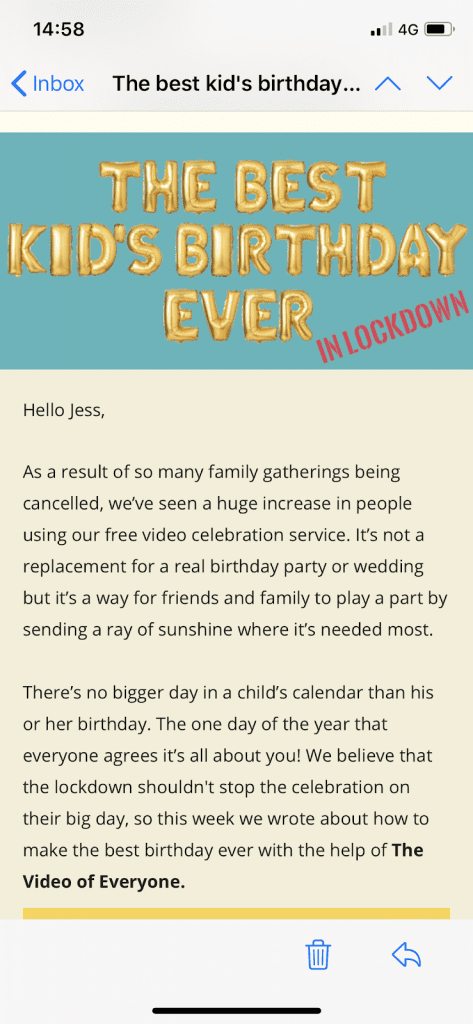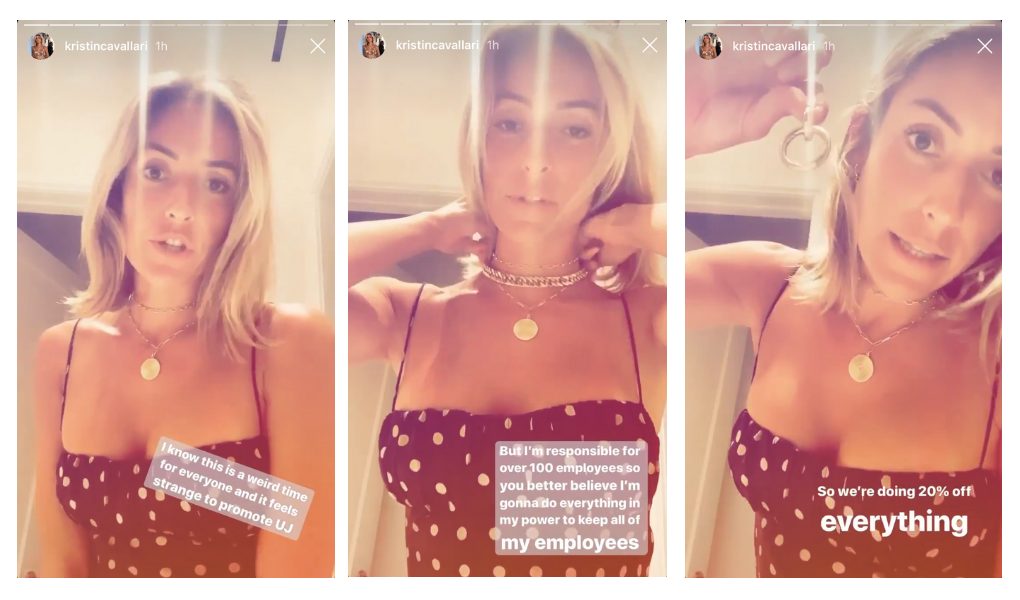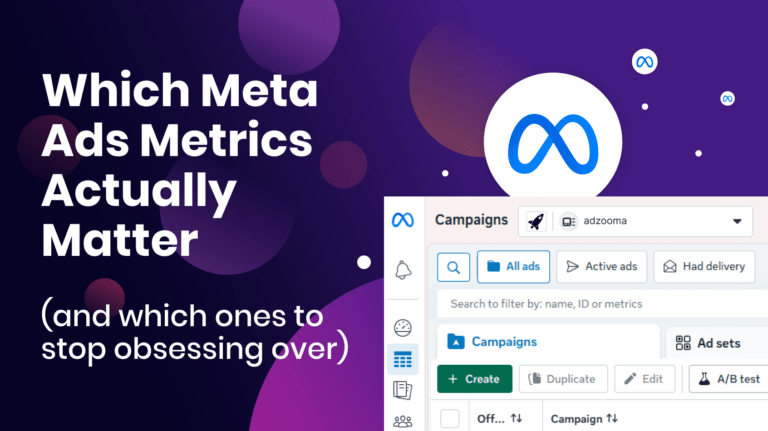Our responsibilities don’t suddenly disappear in a crisis. For many of us, there are bills to pay, mouths to feed, and a roof to keep over our heads – whether our businesses are bringing in 5k or 50k a month. We can’t press the pause button on our outgoings, so we can’t press it on our businesses either.
No matter the size or type of your company, knowing exactly how to sell to your customers during this tough time will help you achieve more success. As the saying goes: you reap what you sow and that’s no different in business.
Here’s how you can be socially conscious when selling through COVID-19, with actionable tips to keep your customers onside.
1. Put yourself in your customer’s shoes
If you don’t know how your customers feel, you aren’t going to be able to sell to them. It really is that simple. People who are deeply affected by the crisis aren’t going to care about your hand-picked bohemian earrings if you’re trying to shove them down their throat like they’re the next best cure. You have to be realistic.
Put yourself in your customer’s shoes. For example, if you received an email from a brand trying to sell you some jewellery, would you rather:
- “Stop stressing today with our beautiful tear-drop two-piece set – perfectly crafted to make you feel better. Buy yours today to make isolation a breeze!”
- “Want to celebrate your loved one’s birthday while social distancing? We have the perfect gift. Or, if you want to treat yourself once the crisis is over, we’ve got you sorted.”
The first option would probably annoy you because it clearly isn’t true. Yet for some reason, it’s how hundreds of brands are trying to sell their products or services during this time.
To avoid this, you can:
- Imagine every customer is your grandparent. You wouldn’t try and trick them into believing a product or service is essential for them, so you shouldn’t do it to your customers either. By selling to everyone like they are someone you respect and wouldn’t want to be taken advantage of, you will speak in a much softer tone, while still including important details.
- Think about your personal needs. If you don’t think it’s important to order items such as jewellery or clothing during COVID-19, don’t assume your customers will be any different. Write your sales pitch in a way that would be convincing to yourself, and the likelihood is it’ll be much more effective than your usual techniques.
- Address the fact your business isn’t a huge necessity. If this is true, admit it before you sell. You can still highlight the benefits of your business, but this will help you come across much more genuine and show that you understand the effects of the crisis. A brand that has done this particularly well is the personalised gift company, The Book of Everyone, as you can see in their email here:

Better yet, there are several CRM platforms that can help to improve your messaging and scale your lead generation. They’re great for building relationships, analysing key interactions, and putting strategies in place to focus on customer retention.
If you aren’t sure where to look, Adzooma Marketplace can put you in touch with CRM agencies who specialise in these areas.
2. Reevaluate your content
To be socially conscious doesn’t mean to completely get rid of your entire marketing strategy. If you had a plan in place, you can adapt the content you were originally going to publish and turn it into something much more suitable during COVID-19.
A good example to learn from is VSCO, a photography mobile app which recently launched its new video-editing feature “Montage” at the beginning of the crisis. Had COVID-19 never happened, they probably would’ve marketed this as a way to collate and edit your favourite photos and memories in the app, from travelling, special occasions, and more.
However, since it was announced on 22nd March 2020, just two days before the UK went into lockdown, the feature was revealed in a much softer and less promotional tone. The email read:
“Share your perspective with us
As the world slows down, we know that these times can feel difficult and uncertain. And in a small way, we hope our community connects you with others around the world documenting their realities and finding beauty around them.
We also hope that you keep making and sharing your perspective with VSCO Montage, the newest storytelling tool included with membership.”
All three of these points are extremely important: now we’re in a crisis, the things people ‘need’ have quickly turned into luxuries that they can go months without, making it harder than ever for businesses to sell non-essential items. But, when like VSCO, you find a way to sell with compassion, consideration, and understanding, you’ll find people still want to buy from you.
Simply adapting your language also works well, especially if you can use it to fit in with conversations amongst your target market. American brand Anthropologie is a good example of this, keeping their customers engaged through Instagram captions about isolation.

3. Use social media
Blending social media with other marketing channels can really help to drive you more profits, even if you have to step away from the traditional sales techniques you’re used to. Selling doesn’t always mean harsh, straight-to-the-point, and direct promotions, particularly during a crisis.
Social media can have untold benefits for your business. As well as allowing you to promote your products or services without the hassle of PPC advertising (pay-per-click), it gives you the chance to highlight your brand naturally as your posts will be surrounded by other generic content.
The best thing? Techniques like this are made even easier with social media marketing agencies.
Moreover, social platforms are a great way to humanise your brand during COVID-19 by being upfront and honest about the effect it’s having on your business. American television personality, fashion designer, and actress Kristin Cavallari did this excellently, as she promoted a sale for her jewellery brand Uncommon James.
Here’s what she posted on Instagram:

As you can see, she was honest and transparent about her motivations rather than trying to flog her jewellery because she wanted money, which proved she isn’t going to hide behind her impressive following to dilute the impact of the crisis. The fast-paced nature of social media would’ve also spread this message far and wide, making it much more effective than some cold telephone calls.
If your brand or existing social media persona doesn’t really suit this type of content, increasing brand awareness during the crisis will lead to an increase in sales when COVID-19 passes. Some great examples include:
- McDonalds Brazil running an ad showing its iconic golden arches separated to indicate social distancing
- Nike launching a campaign encouraging people to ‘play inside’, with the line “If you’ve ever dreamed of playing for millions around the world, now is your chance.”
To figure out which platforms are worth advertising on during this period, there are useful resources online that break down discussions about COVID-19 and note which ones seem to be the most popular.
Lay the groundwork for an incredible future
Selling your product or service during COVID-19 might not be easy, but it definitely isn’t impossible. Even if you aren’t getting a regular stream of customers right now, considering your context and tone, reevaluating your content, and soft selling on social media can build the foundations for a great strategy once the crisis has passed.
And remember, not everyone is going to be your customer, and that’s okay.
You don’t need everyone to like you, but to keep those who do onboard, you need to prove that you are an attentive, authentic, and caring brand.




